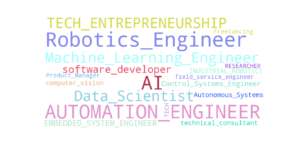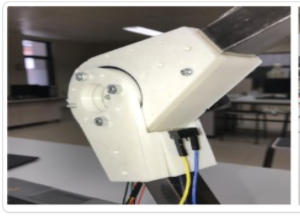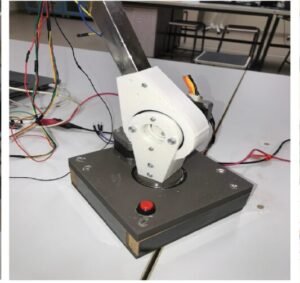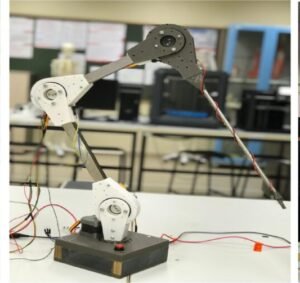Undergraduate Program
BS Robotics and Intelligent Systems
Quick Link
Introduction
BS in Robotics and Intelligent Systems at Salim Habib University is a four-year degree program designed to equip students with the essential skills and knowledge needed to excel in the rapidly evolving fields of robotics, artificial intelligence (AI), and intelligent systems.
The program, meticulously designed to meet the needs of both academic and industrial careers, ensures that students emerge with and are able to experience:
About Program
Program Objectives
PEO-1: Graduates would be competent individuals in their respective field to meet the technological challenges related to design, develop, and implement intelligent robotic systems for diverse applications.
PEO-2: Graduates would reflect moral values, ethical and professional attitude, leadership skills as well as entrepreneurial qualities.
PEO-3: Graduates would be able to engage in lifelong learning and support the global community with involvement in emerging technological research and development.
Internship and Career Prospects

Robotics Engineer: Design, build, and maintain robotic systems to enhance automation and efficiency in various industries.
AI and Machine Learning Expert/Developer: Develop intelligent algorithms that enable robots and systems to learn from data and make autonomous decisions
Data Scientist: Analyze and interpret data to improve the performance and capabilities of intelligent robotic systems.
Computer Vision Engineer: Create systems that enable robots to interpret and process visual information for navigation and interaction.
IoT and Embedded Systems Engineer: Design and integrate smart devices that communicate within the Internet of Things to support intelligent robotic systems.
Autonomous Systems Engineer: Design and develop self-operating robots and systems for applications such as autonomous vehicles and drones.
Automation Engineer: Implement automated robotic systems to enhance efficiency and productivity in industrial operations.
Tech Entrepreneur: Innovate and launch businesses focused on advanced robotics and intelligent system technologies.
Software Developer: Create software that enables robots and intelligent systems to perform complex tasks and solve real-world problems.
Smart Systems Developer: Design integrated intelligent systems that enhance the functionality and connectivity of robotic devices and environments.
Freelancer: Offer specialized services in robotics and intelligent systems, working on diverse projects across industries.
Researcher: Conduct research in robotics and intelligent systems, contributing to advancements and technological breakthroughs.
Control Systems Engineer: Design control systems that govern the behavior and performance of intelligent robotic systems.
Product Manager: Oversee the development and launch of robotics and intelligent systems products, ensuring they meet market needs and business objectives.
Technical Consultant: Provide expert advice on implementing and optimizing robotics and intelligent systems for various clients.
Field Service Engineer: Install, maintain, and repair robotic and intelligent systems, ensuring optimal performance in real-world environments.
Hands-on Learning and Innovative Projects





From Concept to Showcase: Students Designing, Building, and Presenting Their Innovative Project “Robotic Grasper with An Integrated Haptic Feedback Mechanism”
The Robotic Grasper with an Integrated Haptic Feedback Mechanism exemplifies the cutting-edge work being done within the Faculty of Engineering. Developed using our state-of-the-art in-house 3D printing facility, this project highlights the advanced capabilities of our engineering students and faculty. Leveraging on-campus 3D printing resources allows us to create highly precise and customized components, ensuring optimal performance and functionality.
We are especially proud of faculty of Engineering students behind this project—Syeda Fakhra Jalal, Zarish Majid Shaikh, and Mirza Areeb Baig. Their innovative Robotic Grasper has secured 3rd place in the final round of the prestigious IEEE Region 10 Robotics Competition, one of the leading robotics challenges in the Asia-Pacific region. This achievement marks the second consecutive year that a team from SHU has secured a spot in this elite competition, underscoring our commitment to hands-on learning and technological excellence.
Scheme of Study (Semester Wise)
- Duration: 4 Years
- Semesters: 8
- Credit Hours: 135
1st Year
Semester - Ⅰ
| Course Code | Course Title | Credit Hours |
| MTH 101* | Basic Mathematics | 3+0 |
| PHC101 | Applied Physics | 2+1 |
| IST101 | Islamic Studies/Ethical Behavious | 2+0 |
| ENG101 | Functional English | 3+0 |
| CSCxxx | Introduction to Information & Communication Technologies | 2+1 |
| ELE101 | Basic Electrical Engineering | 3+1 |
| RIS101 | Engineering Workshop | 0+1 |
| Total Credit Hours | 16 | |
Semester - ⅠⅠ
| Course Code | Course Title | Credit Hours |
| ICPxxx | Ideology & Constitution of Pakistan | 2+0 |
| XXXxxx | Foreign Language | 2+0 |
| MTH103 | Calculus & Analytical Geometry | 3+0 |
| RIS102 | Engineering Mechanics | 2+1 |
| CSC103 | Object Oriented Programming | 3+1 |
| ELE103 | Electronics – I | 3+1 |
| Total Credit Hours | 18 | |
2nd Year
Semester - ⅠⅠⅠ
| Course Code | Course Title | Credit Hours |
| MTH201 | Linear Algebra & Differential Equation | 3+0 |
| CSCxxx | Data Structures & Algorithm | 2+1 |
| ELE203 | Digital Logic Design | 3+1 |
| BME201 | Computer Aided Engineering Drawing | 0+1 |
| ELE204 | Electronics – II | 3+1 |
| RIS241 | Introduction to Robotics | 2+0 |
| XXXxxx | Occupational Health and Safety | 1+0 |
| Total Credit Hours | 18 | |
Semester - ⅠⅤ
| Course Code | Course Title | Credit Hours |
| XXXxxx | Civics and Community Engagement | 2+0 |
| MTH202 | Complex Variable & Transformation | 3+0 |
| MTH301 | Statistics | 3+0 |
| ELE302 | Signals & Systems | 2+1 |
| RIS221 | Microprocessor and Interfacing | 2+1 |
| RIS242 | Robotic System & Programming | 2+1 |
| Total Credit Hours | 17 | |
3rd Year
Semester - Ⅴ
| Course Code | Course Title | Credit Hours |
| RIS331 | Introduction to Data Science | 2+1 |
| RIS211 | Digital Signal Processing | 3+1 |
| RIS212 | Control Systems | 3+1 |
| RIS332 | Artificial Intelligence | 2+1 |
| RIS322 | Embedded System | 2+1 |
| Total Credit Hours | 17 | |
Semester - ⅤⅠ
| Course Code | Course Title | Credit Hours |
| MTH302 | Numerical Analysis | 3+0 |
| RIS313 | Digital Image Processing | 2+1 |
| RIS333 | Introduction to Deep Learning | 2+1 |
| RIS323 | Sensors & Actuators | 3+1 |
| RIS343 | Robot Modeling & Control | 3+1 |
| Total Credit Hours | 17 | |
4th Year
Semester - ⅤⅡ
| Course Code | Course Title | Credit Hours | |
| RIS449 | Final Year Design Project I | 0+3 | |
| Expository Writing | 3+0 | ||
| RIS444 | Human-Robot Interaction | 3+1 | |
| XXXxxx | Elective I | 3+0 | |
| XXXxxx | Elective II | 3+0 | |
| Total Credit Hours | 16 | ||
Semester - ⅤⅢ
| Course Code | Course Title | Credit Hours | |
| RIS449 | Final Year Design Project II | 0+3 | |
| Principles of Management and Economics | 2+0 | ||
| MGT401 | Entrepreneurship | 2+0 | |
| RIS445 | Industrial Automation | 2+1 | |
| XXXxxx | Elective III | 3+0 | |
| XXXxxx | Elective IV | 3+0 | |
| Total Credit Hours | 16 | ||
